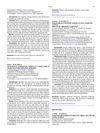 April 2019 in “Journal of Investigative Dermatology”
April 2019 in “Journal of Investigative Dermatology” Caffeine can protect scalp hair follicles from damage caused by UV radiation.
 September 2011 in “Clinical Biochemistry”
September 2011 in “Clinical Biochemistry” Glycoconjugates help heal hair follicles during skin repair.
Proper nutrition and vitamins can boost the immune system and overall health in older adults.
5 citations,
September 2018 in “International journal of genomics” Genetic mutations that disrupt homocysteine breakdown lead to increased damage in mouse hair keratin.
 18 citations,
July 2022 in “Frontiers in Immunology”
18 citations,
July 2022 in “Frontiers in Immunology” Volatile organic compounds can cause inflammation and increase the risk of autoimmune diseases.
 17 citations,
May 2018 in “PeerJ”
17 citations,
May 2018 in “PeerJ” VB-1, a natural compound, may promote hair growth by enhancing a key cell growth pathway.
7 citations,
August 2020 in “Current topics in medicinal chemistry” New cancer treatments aim to reduce side effects and improve effectiveness.
 2 citations,
February 2022 in “BioMed Research International”
2 citations,
February 2022 in “BioMed Research International” LED light therapy at 863 nm wavelength can slow down skin tumor growth and reduce inflammation in mice.
2 citations,
January 2019 in “Egyptian Journal of Dermatology and Venereology” Insulin might be involved in causing hair loss and acne.
 April 2024 in “Skin appendage disorders”
April 2024 in “Skin appendage disorders” Environmental pollutants can damage hair health and cause hair loss.
May 2023 in “Clinical, Cosmetic and Investigational Dermatology” More personalized and effective treatments for androgenetic alopecia are needed.
 July 2021 in “IntechOpen eBooks”
July 2021 in “IntechOpen eBooks” Ginseng, especially its component ginsenosides, can promote hair growth, reduce hair loss, and potentially treat conditions like alopecia by affecting cell pathways and cytokines.
 January 2019 in “Obstetrics & Gynecology International Journal”
January 2019 in “Obstetrics & Gynecology International Journal” Hormonal changes and conditions like polycystic ovarian syndrome are major causes of adult acne in women, with varying prevalence among different ethnicities.
 January 2014 in “Cosmoderma”
January 2014 in “Cosmoderma” The document concludes that personalized treatment plans for hair loss in Asian men are necessary and more research is needed to develop effective guidelines.
 34 citations,
September 1985 in “Contact Dermatitis”
34 citations,
September 1985 in “Contact Dermatitis” Minoxidil can cause skin irritation like eczema and rash in some users.
 2 citations,
January 2018 in “Elsevier eBooks”
2 citations,
January 2018 in “Elsevier eBooks” Lipid nanoparticles improve drug delivery through the skin, offering stability, controlled release, and better compatibility with skin.
 47 citations,
December 2006 in “Therapy”
47 citations,
December 2006 in “Therapy” The dietary supplement helped increase hair growth in women with hair loss.
 29 citations,
March 2011 in “The Journal of Nutritional Biochemistry”
29 citations,
March 2011 in “The Journal of Nutritional Biochemistry” Eating isoflavone can help mice grow hair by increasing a growth factor.
 18 citations,
October 2014 in “Experimental Biology and Medicine”
18 citations,
October 2014 in “Experimental Biology and Medicine” Eating vitamin A affects hair growth and health by changing cell signals in mice.
 11 citations,
September 2012 in “Journal of animal physiology and animal nutrition”
11 citations,
September 2012 in “Journal of animal physiology and animal nutrition” Higher protein diets with DL-methionine improve mink hair growth and fur quality.
 6 citations,
February 2021 in “Frontiers in Cell and Developmental Biology”
6 citations,
February 2021 in “Frontiers in Cell and Developmental Biology” Eating too much or too little vitamin A can cause hair loss.
6 citations,
December 2014 in “PubMed” A supplement for hair loss with green tea in it may cause liver problems.
5 citations,
October 2021 in “Clinical, cosmetic and investigational dermatology” Japanese patients with alopecia areata often have a higher BMI and consume more vitamin C, fruit, and retinol, which may affect their condition's development or severity.
 3 citations,
October 2022 in “Han'gug dongmul jawon gwahag hoeji/Han-guk dongmul jawon gwahak hoeji/Journal of animal science and technology”
3 citations,
October 2022 in “Han'gug dongmul jawon gwahag hoeji/Han-guk dongmul jawon gwahak hoeji/Journal of animal science and technology” Adding L-glutamine to the diet of Hanwoo steers may boost their immune system and help them cope with heat.
 2 citations,
November 2017 in “Food Additives & Contaminants: Part A”
2 citations,
November 2017 in “Food Additives & Contaminants: Part A” The new method accurately detects illegal hair-growth drugs in dietary supplements.
 2 citations,
April 2016 in “Más dermatología”
2 citations,
April 2016 in “Más dermatología” The supplement with Serenoa repens and Pygeum africanum significantly increased active hair growth and decreased rest phase hair in post-menopausal women with hair loss, with only mild digestive side effects.
 September 2024 in “Journal of the American Academy of Dermatology”
September 2024 in “Journal of the American Academy of Dermatology” Dietary changes and supplements mostly did not improve alopecia areata.
 June 2024 in “Archives of dermatological research”
June 2024 in “Archives of dermatological research” Dietary supplements might help prevent post-COVID hair loss, but serum ferritin is not a reliable indicator.
March 2024 in “LGU journal of life sciences” Poor diets worsen PCOS symptoms in young women.
 February 2024 in “Scientific Reports”
February 2024 in “Scientific Reports” Topical minoxidil and dietary supplements improved hair regrowth in children with hair loss from chemotherapy.






















